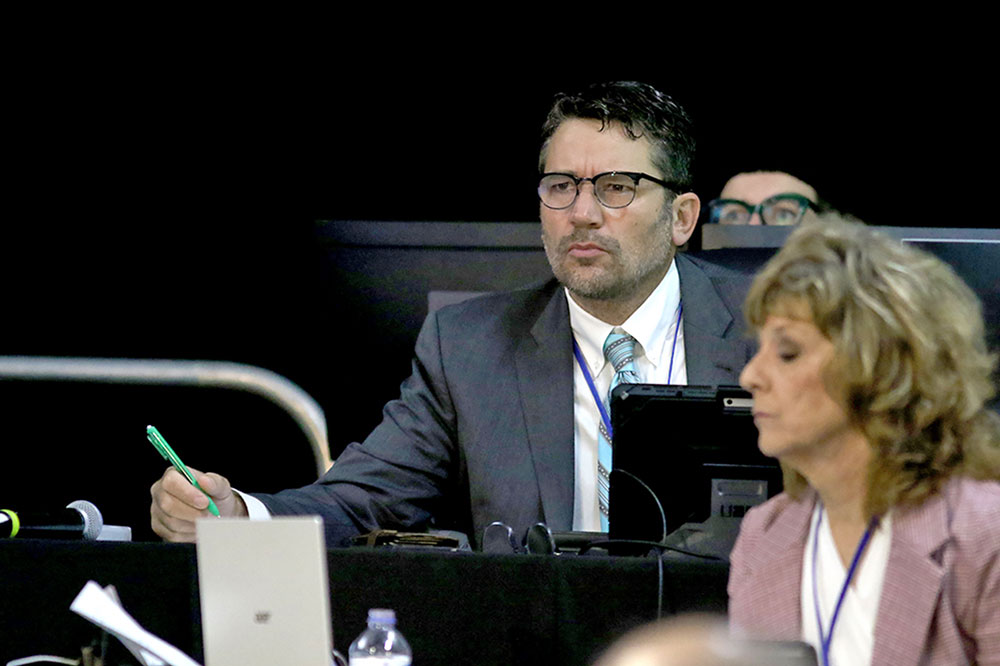Supervisors: New state law could impact local budgeting process
By Bob Steenson, bsteenson@charlescitypress.com
Floyd County Supervisors made the first tentative steps toward talking about the next fiscal year budget during a workshop meeting Monday morning.
One wrinkle is a new law that the Iowa Legislature passed and Gov. Kim Reynolds signed earlier this year that proponents said is designed to increase transparency in the budgeting process.
The new law requires additional notification and public hearings if a city or county decides to collect more taxes than the previous year, and requires a supermajority vote to approve a total tax increase greater than 2 percent.
Rep. Dustin Hite, R-New Sharon, who supported the law, said it forces local officials to justify bringing in more money, instead of relying on rising property values.
“They can’t say, ‘We didn’t raise your property taxes, your assessment went up.’ We’re trying to take that part of it out,” Hite said.
Democrats said the new law could threaten the state’s public pension, the Iowa Public Employees’ Retirement System, known as IPERS, because spending on that fund for city or county employees will be part of the overall spending consideration.
“This bill is subjecting that funding to this cap,” said Rep. Todd Prichard, D-Charles City. “It makes it an option in the political process whether they want to fund that.”
Republicans said the law won’t affect IPERS and said they are standing by a promise to not change the public retirement program.
Many cities and counties opposed the legislation, saying it does nothing to reduce property taxes but is one more step toward taking control out of local hands.
The new law, which goes into effect for the next fiscal year budget, which will start on July 1, 2020, requires that cities and counties give the public an extra notice and hold an extra public hearing if they plan to collect more total taxes in the basic and supplemental funds than the previous year.
If they plan to collect more than 102% of the previous year they must approve the budget by a two-thirds majority, rather than a simple majority.
Some of the discussion at the Floyd County supervisors meeting Monday had to do with timing.
Although an extra public hearing could add more time to the budgeting process, the law also moves back the date when budgets must be finished and certified to the state, from March 15 to March 31.
Supervisor Linda Tjaden attended an Iowa State Association of Counties meeting earlier this month with County Auditor Gloria Carr, where the new law and other budgeting issues were discussed.
Tjaden had asked that the topic be on the agenda Monday, to discuss “how we can maybe make some improvements to the budget process this year.”
One area, she said, might be to ask outside groups that come before the board seeking funding to submit material ahead of time so board members can look it over before the groups make their presentation.
She also suggested keeping overall track of specific types of budget items among all the departments, such as capital expense requests and personnel changes.
“Is there a better way of doing that?” she asked. “I just think there are some things we could do a little bit differently this year and I just want to throw that out there.”
One area Tjaden said she would like to see get more attention is long-range planning, and how budget requests fit in to that plan, especially with the new county law enforcement center being built and updates made to the courthouse, which will likely make budgeting tighter in coming years.
When a department or an outside group asks for funding for a purchase or a project, the board should look at whether it fits with its long-term goals, she said.
“Just to be able to say, ‘Does that meet that criteria or not?’ And then say, ‘OK, maybe not now, but maybe in a year or two we can re-evaluate it,’” Tjaden said.
“We haven’t really done that, other than now we’ve got this major project going on. How does that change where our direction should be focused?” she asked.
Also at the meeting Monday, Tjaden gave a progress report on the law enforcement center project. She said construction manager The Samuels Group would be meeting with contractors Tuesday to discuss potential cost savings in the bids and timing for the project.
She said she is still working on the possibility of using the 500 North Grand building — the former middle school — to house county offices during courthouse work.
But Supervisor Doug Kamm said he isn’t committed to moving to that building.
“Every one of those contractors has experience working around people,” he said.
Auditor Carr said the district court has said it will work with the county as much as possible regarding scheduling. Many routine matters can be handled during times when there is less noise or commotion, but some trials may need to be moved to a different site because of the need for jurors to hear clearly and not be distracted by construction.
Tjaden said the contractors meeting Tuesday may provide some more answers regarding timing and whether temporarily moving county offices to another location would be worth the cost and effort.








Social Share